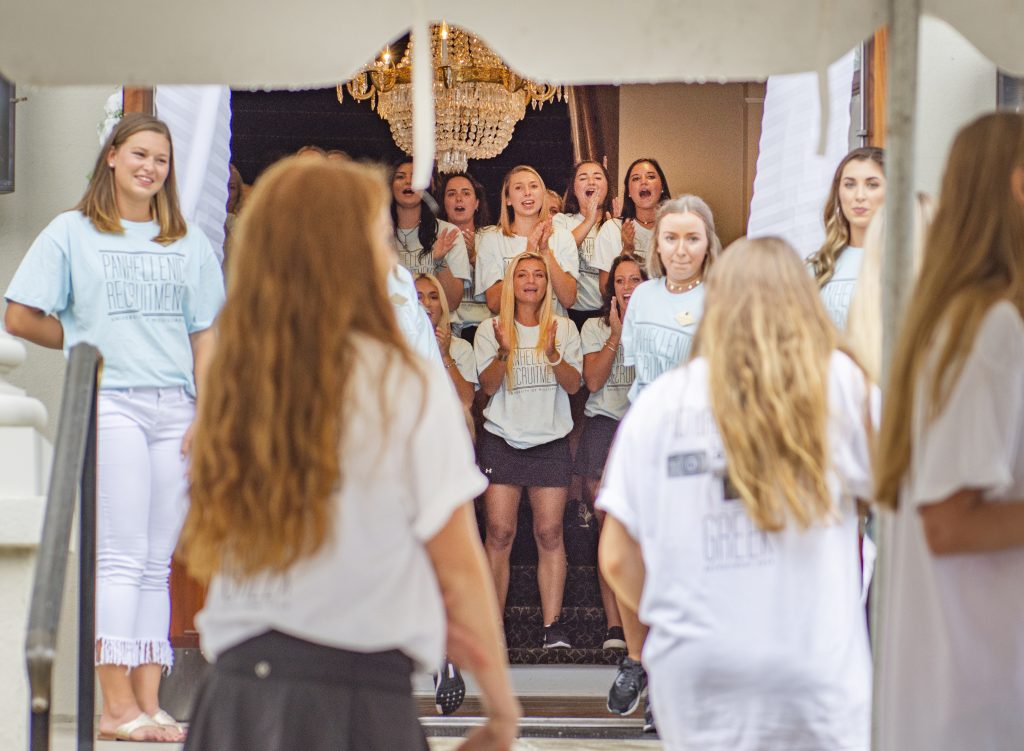Sorority recruitment is over. Long gone are clap routines and ear-piercing choruses about sisterhood. The veil of secrecy surrounding this process has been lifted, and order has been restored to Greek life.
But what exactly is recruitment?

Ole Miss students going through sorority recruitment wait outside of a house during rush week. Photo by Christian Johnson
For one week of each year, the Ole Miss campus is consumed by sorority recruitment. Though only spanning seven days and involving a little more than one-third of the campus population, rush seems to control the consciousness of the university. Professors modify schedules, clubs cancel meetings and for 1,400 girls, a monumental decision looms.
The scene around campus during recruitment week is as logistically sound as it is frantic. Potential new members (PNMs) decked out in everything from Panhellenic-provided T-shirts to business casual attire dart about the campus. Breaking only on Wednesday, these girls are enthralled in the process of visiting houses, making selections and waiting. And while the interactions inside the houses are perceived as intimidating, the recruitment counselors say the waiting process is generally the most cumbersome.
During the designated recruitment times, if PNMs are not in a sorority house, they are to be confined to the Student Union Ballroom. So if a girl has two houses to visit but there are six designated time slots for visiting, that girl must wait in the Student Union for the other four rounds to conclude — without their cell phones. Phones are confiscated at the beginning of rounds and are delivered back at the end. But it’s not arbitrary oversight; there’s a distinct reason for this confinement.
Moms.
“A lot of times, we’ve had bad interactions with parents,” Joy Myers, a junior recruitment counselor, said. “They’ve tracked their kids down, picked them up — just kind of stalking them as they go across their rounds.”
As recruitment counselors, 120 women dictate the success of the recruitment process.
Per the Panhellenic website, recruitment counselors “are active sorority women who disaffiliate from their chapters in order to aid PNMs through the recruitment experience each Formal Recruitment.”
Starting their positions the Sunday before classes begin in August, these women serve as confidants, armchair psychiatrists and friends to the roughly 13 girls that each are assigned to. Following that Sunday, they meet weekly with their group of PNMs to answer questions and give advice.
Recruitment counselors tell stories of chasing down moms that cruise down Sorority Row in hopes of communicating with their daughters or of finding moms hiding in trees in an attempt to influence their daughters’ decisions.
“I think it just adds to their daughters’ stress — just their presence and their pressure. Especially if they’re a legacy to a certain chapter — the mom definitely going to push them,” junior recruitment counselor Sally Autry said.
The maternal influence has been heavily chronicled, most recently in a post published by The Daily Mississippian that outlines the influence of third-party “rush consultants” in the recruitment process.
These consulting firms, located around the South in areas such as Oxford, Jackson and Birmingham, Alabama, purport to prepare PNMs for recruitment. They prepare “packets” for girls, scrutinize girls’ social media posts and suggest wardrobe choices. But this isn’t cheap — some firms charge girls up to $125 per hour for a process that’s already delineated by the Panhellenic team and given to them free by recruitment counselors.
These parents aren’t placing a retainer on an attorney or paying utilities — they’re paying ex-sorority members to critique their daughters in hopes of joining an exclusive social club.
In addition to the stress of navigating the actual recruitment process, perhaps the most emotionally taxing process, selections, is done in total silence.
After the second round — and following each round after — PNMs must line up at The Inn at Ole Miss and find out what houses they have been released from. Then, they choose houses they want to return to. Lining up single-file and waiting for their turn, potentially for hours, these girls are consigned to silence.
“(PNMs) have to be silent unless they’re talking to their recruitment counselor,” junior recruitment counselor Olivia Cusimano said. “Girls don’t start doubting what they like until they hear what other people are saying.”

Ole Miss students going through Panhellenic recruitment walk behind Barnard Observatory on their way to a meeting during rush week. Photo by Christian Johnson
Junior recruitment counselor Stephanie Green said her own experiences during the rush process from the active member side influenced her decision to become a recruitment counselor.
Green said she “wasn’t as thrilled with how rush works when (she was) in the sorority.”
This a common theme with recruitment counselors. After a year in their chapters, some of these women become dismayed with how the process works from the inside.
The process by which sororities accept new members varies by chapter, and most of these processes are not disclosed to the public. Some houses give PNMs a numerical ranking based upon their interactions during rounds, and some hold “bid sessions” where the totality of the chapter votes on whether or not to accept a PNM.
“You talk to a girl for 30 minutes, then give them a score. And then, she gets released,” Autry said. “It was hard being in the house last year basically ranking girls on the conversation(s) I had with them. It wouldn’t matter if the girls weren’t known in the chapter, and it doesn’t matter if I gave them a great score or not. They wouldn’t be there the next day. I just thought that was so unfair.”
Some recruitment counselors say theirs isn’t a glamorous position. Counselors must disaffiliate totally from their chapters for six weeks, reaping no financial or incentivized benefits other than a successful recruitment process.
So why do they do it?
“I just love the freshmen. I consider myself a third-year freshman. They’re so vulnerable at this stage, and I like being able to be there for them when no one else is,” Green said.
As the dust settled on recruitment and the joys of Bid Day ensued, the rollercoaster of emotions wrought by this seven-day process screeched to a halt. PNMs are now new members awaiting initiation, recruitment counselors have returned to their houses and order has been restored to campus.
Well, until the cycle begins again next fall.






